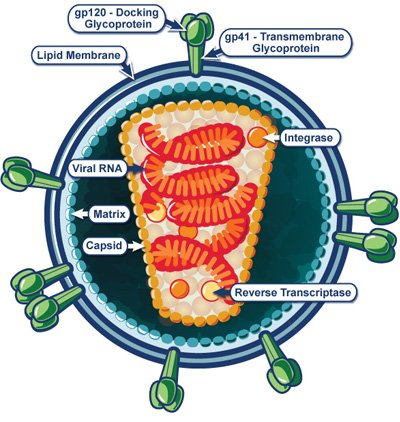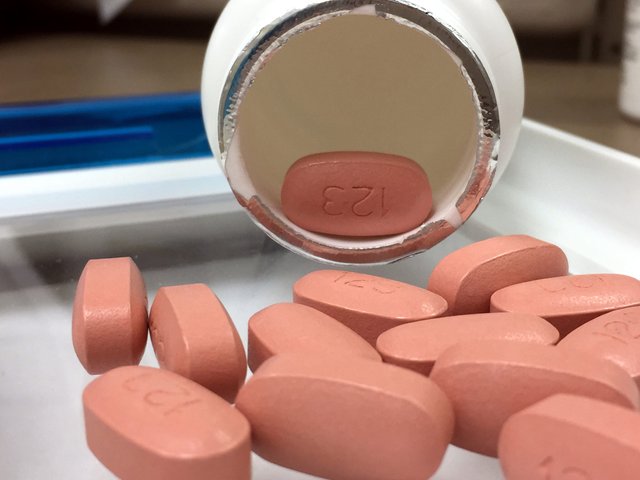The Gentleman Medical Series #2; Living with HIV

I knew what you're thinking, and you're wrong. I've never been infected with HIV, and I hope it will stay that way. For those of you who are not in the medical background, you must have heard the acronym, HIV, before. There are a lot of advertisements on the television which promote awareness campaigns against intravenous drug users, and I'm sure the acronym was mentioned a few times. You might think, "Well poor guy, he's going to die soon", but fortunately, nowadays, with the advancement in the field of medicine, even people with HIV can live a relatively healthy life. You knew that HIV is something related to a disease which you do not know what exactly it is, so today, I will be explaining some vital pieces of information that you need to know to understand this kind of pathology, better.
HIV is a name of a virus. The acronym stands for the Human Immunodeficiency Virus (HIV); it is a type of virus which came from a family called Retroviridae. Most of the people out there thought HIV is a kind of disease, well this virus does cause illness, but the acronym itself doesn't represent the condition. There are two types of HIVs, and genetic analysis has confirmed that this virus has been infecting people since 1920.
- Human Immunodeficiency Virus (HIV) I (originated from a non-human primate)
- Human Immunodeficiency Virus (HIV) II
Even though nowadays, there are many movements and awareness programs being conducted by any governmental or non-governmental-related organisation to educate people on this particular virus, there are still a lot of misconceptions circulated among the general public about how this particular virus spread. I mean, I did mention in my previous article that people nowadays, can get an MD from Google but what worse is any people who think they know everything without even care to refer to any of the evidence-based studies. Well, the majority of this infection is transmitted via sexual intercourse, and people might get infected if they experience direct contact with a contaminated blood product while having an opening on the skin (wound) or anything that might give access to the virus to enter our body. These include:
- Needle's sharing among intravenous drug users
- Vertical transmission from mother to her child during pregnancy (can be avoided by taking medicine regularly)
- Being struck with any sharp object that has been contaminated with HIV (blood taking procedure)
- Being transfused with contaminated blood product (rare now due to rigorous blood testing effort)
- Bitten (yeah, why not) by people with HIV (usually involved severe wound)
- Mouth kissing if both of them have some sores or any wound in their mouth which can be an access route for HIV
- Oral sex (extremely rare)
Paranoid yet? People do love to focus on something that is harmful to them. Even though the way an individual can get infected is quite a list, but there are some situations in which the chances for an HIV to be transmitted are almost negligible.
- Hugging, social kissing or sharing dishes are safe. It is because HIV is not transmitted through saliva, tears or sweat.
- Mosquito's bite. If HIV can be transmitted like a dengue fever could, well, this world is fucked up. We should all move to Iceland as soon as we can. I mean, that particular island is free from a mosquito.
- Air transmission. I don't think I need to explain this point. HIV is not an airborne infection, period.
HIV would take about two weeks before it can be found anywhere in the body including the nervous system. There are few places, however, where the concentration of HIV viruses would give a clue to the overall individual health. These include:
- Blood
- Semen or vaginal secretion
- Cerebrospinal fluid (CSF)
Like any other infections, our bodies going to fight it off by activating a series of immune responses toward the HIV viruses for about 3-6 weeks. Within that duration, an infected person can show some common symptoms which would also present in the other viral infections such as fever, fatigue, malaise, rash and gastrointestinal upset.
The course of the disease is disastrous if an individual decides to go without antiviral treatment. There is a different progression taken by people who have been infected with HIV I and HIV II. For HIV I, the mean duration before the onset of Acquired Immune Deficiency Syndrome (AIDS) was approximately ten years while for HIV II, it is 15 years. Now, it's time for you to guess, what is the average duration for an individual who has been infected by HIV I or II but currently under the antiretroviral treatment, to develop AIDS? The course is indefinite. Nobody could tell, but the majority of them lead a normal, healthy life without even getting any symptoms related to AIDS.
This signal the importance of getting an early diagnosis so that treatments could be started which could improve their prognosis. The drugs which are being used to treat HIV patients are evolving and getting better. However, the medications taken by the patient were not designed to kill the virus entirely; it's taken to withhold the onset of AIDS.

Now, imagine, you went to a clinic, yesterday, to do some routine annual checkup and it turns out, you're tested positive for HIV. Your doctor try to persuade you that the result might be a false positive and he went on about a more accurate test to be done with your consent, but your mind started to wander the possibility of you having those viruses in your system. Close your eyes, and try to think, what is the first things that you were afraid of when you're being diagnosed with HIV-positive? People's judgement? Losing your job?
The truth is, even though there are many governmental efforts to reduce stigma in various diseases, especially mental health, people are still sceptical. Hell, even some of the people who work in the medical profession were sceptical too. Knowledge seems insufficient to alleviate the fear of being harm by people with a specific kind of conditions, and even worst, people often have some contradicting theories about how they are going to get infected if they were befriended someone who has been tested positive with HIV.
There are so many things that a specific campaign can do to alleviate the public's fear, but if this thing doesn't seem to improve, it's going to get a whole lot worse for some of the people who unknowingly live with the virus. Imagine, if someone had that virus, he wouldn't go for an HIV checkup if the resulting outcome could risk him being ostracised by the society so that he would go about, unknowingly he has been infected. He could engage in an activity which causes the virus to spread, and this situation would get a whole lot worse if he kept on living without proper treatment. It has been estimated that among all of the people who had been infected by this virus, 60% of them are unaware of their positive status. It is more than half of the HIV patient population. The number would keep on increasing if none of the necessary steps is to be taken.
If you think stigma is usually directed towards people who are currently affected by certain illnesses only, then you're wrong. There are some populations who don't even have the disease were also discriminated by the society as they were involved in a particular habit or activity which could predisposed them towards the disease itself. This includes homosexuality, intravenous drug users and sex workers (or if you would like to call them "escorts", whatever). Overall, stigma related to HIV/AIDS are usually directed to:
- People who are affected by the illness (HIV or AIDS)
- Sex workers
- Homosexual couple
- Intravenous drug users
- Gender discrimination
All of these key demographics are usually violated, discriminated, harrassed, abused and denied their access to any health services. This would lead to marginalisation from any social, economic or legal benefits which are usually thought to be the basic rights of an individual. These could lead to:
- Poor physical, emotional, social wellbeing
- Increase tendency to any risky and dengerous behaviour which could predisposed them to any form of sickness
- Poverty
The ultimate outcome that we're currently analyse is the probability to develop an illness. Of course, all of the three consequences mentioned above would increase the chances for an individual to get a disease. It's almost the same with any kind of illness, the difference would be the key populations which are high-risk of getting the illness.
People who engaged in a risky behaviour that increase their chances to develop HIV should be monitored and advised adequately so that the probability of getting infected could be minimised. We can't ignore them, as, whatever they are getting, could affect the society in some ways. By that logic, medical professionals should be the one who promotes a stigma-free attitude towards all of the key populations listed so that they were motivated to be screened and treated if they were affected. However, this is not the case as in 2016; the European Economic Area has reported that the majority of countries in Europe (60%) has shown some stigmatising attitude towards the aforementioned key demographics which hampered the effort to promote the HIV prevention program. By this report entails the attitude of medical professionals towards the populations.
If we want to talk about the risk of getting infected with HIV, then:
- An intravenous drug user is 24 times more likely to get infected
- Homosexual men are 24 times more likely to get infected
- A sex worker is ten times more likely to get infected
- Transgender populations are 49 times more likely to get infected
- Prisoners are five times more likely to get infected
All of the risks are calculated relatives to the general population.
Stigma is a broad term; some people think stigma is defined as the act of ostracising someone from the society, denying social interaction. Well, that's not true. Let's see some form of stigma which could be related to HIV and AIDS.
- Self-stigma: People who are infected with HIV are usually afraid of two things; negative responses from the community and fear of spreading the virus to other people. It could lead to guiltiness, worthlessness, feeling ashamed and negative thoughts which could affect their treatment adherence, quality of life and the ability to think positively. Depression is one of the most common psychological consequences which could affect the critical populations listed above. A study which is conducted in China has found that depressions which caused by stigmatising attitudes on homosexual communities in that particular country, affect the rate of HIV testing uptake. It would produce an underestimated figures of people infected with HIV which would lead to undertreatment of the HIV-infected populations thus increasing the risk of spread among the general populations.
- Stigma imposed by the government: Well, there are a few countries, which placed sort of legislation to protect people who have been infected by HIV from stigmatisation. This includes access to health care and occupations. However, more than 60% countries in the world have criminalised the key demographics that have been listed above which make screening and providing treatment to an infected people difficult. They won't came out if they knew they could be arrested for committing some offenses. The health of sex workers, drug abusers and homosexual populations has been neglected due to the criminalisation. In some countries such as Australia, legislation which criminalised people who are infected with HIV (HIV-specific law criminalising the Intentional transmission of HIV) has been revoked which signifies a significant step in providing a fundamental right to people living with HIV.
Stigma in healthcare: There are a few forms of abuse imposed by medical professionals to people who are living with HIV. These include minimising or denying contact with HIV patients, refusing to treat people with HIV, taking HIV test without the patient's consent, denying their right to an appropriate counselling and incurring an extra charge for medical services. In 2012, it was reported around 38% of women in HIV-infected population had been subjected to sterilisation without their consent. This is disturbing, I mean, I would be furious if my sex organ is being sterilised without my permission. The most common type of offences among the medical professions is violating the patient's right to confidentiality. I mean, I do get it, some people love to become the centre of attention but telling other people about your patient's condition, however minor it is, is a crime. A survey conducted in 2013 among medical professionals by Grossman cl. has found that 50% of the medical workers think that people who live with HIV "got what they deserved".
Stigma imposed in employment: Social ostracisation, ridicule, refusal of employment and termination of work are some of the examples of the stigma that has to be faced by an individual who is infected by HIV. In Nigeria, 45% of the HIV-infected populations have lost their job due to their HIV status, and 27% of them are being denied from getting employed. In Malaysia, 54% of the HIV-infected population was ostracised by their peers and co-workers due to their positive HIV status. It is a dilemma, I mean, if you are getting a job, do you tell your employer regarding your positive HIV status? This would lead to decrease in productivity at work and depression which could predispose the affected individual to sickness.
Stigma will not only affect the key populations, but also the general population. Our goal is to encourage people who are engaged in a high-risk activity to get tested so that an early intervention can be started to improve prognosis. I know, it is relatively difficult to control our emotion and change our perceptions towards people who has been infected by HIV, but that emotion doesn't need to be materialised into a form of discrimination. Obviously, everyone is entitled to their own opinion but does the opinion of people living with HIV, matter? Think about it.
- German Advisory Committee Blood (Arbeitskreis Blut), Subgroup “Assessment of Pathogens Transmissible by Blood.” (2016). Human Immunodeficiency Virus (HIV). Transfusion Medicine and Hemotherapy, 43(3), 203–222.
- Simon, V., Ho, D. D., & Karim, Q. A. (2006). HIV/AIDS epidemiology, pathogenesis, prevention, and treatment. Lancet, 368(9534), 489–504.
- Stangl, A. L., & Grossman, C. I. (2013). Global Action to reduce HIV stigma and discrimination. Journal of the International AIDS Society, 16(3Suppl 2), 18934.
- Mahajan, A. P., Sayles, J. N., Patel, V. A., Remien, R. H., Ortiz, D., Szekeres, G., & Coates, T. J. (2008). Stigma in the HIV/AIDS epidemic: A review of the literature and recommendations for the way forward. AIDS (London, England), 22(Suppl 2), S67–S79.
- HIV Stigma And Discrimination - Avert










I thought this was going to be a boring webMD-style post but you made it so much more relevant. Good job!
Thank you @mobbs. I have to make it different to avoid falling asleep while typing as well. :)
This article is quite fun. Thank you for spending some time making this. Cheers.
No problem @chloroform. I'm glad you like it.
Interesting article @gameoverr and for debunking some myths related to HIV.
Thank you @sakura1012. :)
😀
Since I was small I was very afraid of it, especially after hearing that people get stung with infected needles in trams.
This has stayed with me over the years until I was 16 or so and I have started to investigate on my own.
I took part in Fight Aids@Home on World Community Grid, basically donating computer power to help check which proteins bind to the virus so they plug it off before sticking to the cells in the body. This was before bitcoin mining was a thing :)
I have about 11 years of contributions there. Plus, I have worked with HIV+ people. Under treatment, some are actually able to live perfect lives and the CD4 and 8 cells are around their normal counts while the viral load is undetectable.
So the chances are that if a person is under treatment, 99% of the time the risk is marginal. The risks comes from the people not under treatment and unaware of the infection, as the virus works on all organs covertly.
Great article and really good initiative! You have my respect!
Congratulations @gameoverr! You received a personal award!
You can view your badges on your Steem Board and compare to others on the Steem Ranking
Do not miss the last post from @steemitboard:
Vote for @Steemitboard as a witness to get one more award and increased upvotes!